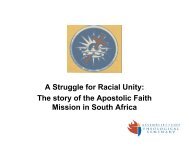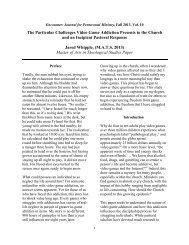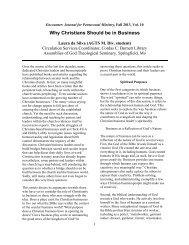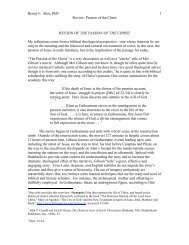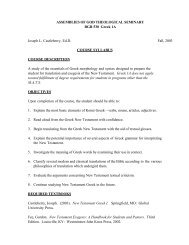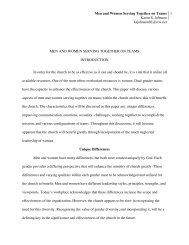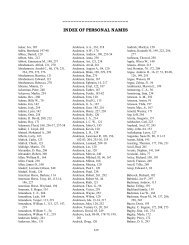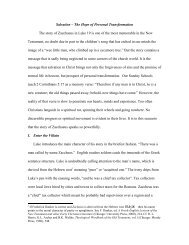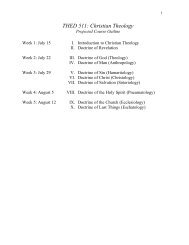Encounter: Journal for Pentecostal Ministry - Assemblies of God ...
Encounter: Journal for Pentecostal Ministry - Assemblies of God ...
Encounter: Journal for Pentecostal Ministry - Assemblies of God ...
Create successful ePaper yourself
Turn your PDF publications into a flip-book with our unique Google optimized e-Paper software.
23 Moltmann, The Trinity and the Kingdom (London: SCM Press, 1981), 38.<br />
24 Moltmann, The Crucified <strong>God</strong> (London: SCM Press, 1974); John Thompson, ―A Trinitarian Theology <strong>of</strong><br />
Cross and Resurrection,‖ in Modern Trinitarian Perspectives (Ox<strong>for</strong>d: Ox<strong>for</strong>d University Press, 1994), 61. Others<br />
would disagree with Moltmann on this point <strong>of</strong> <strong>God</strong> taking into Himself the opposition. For example, Barth in<br />
dealing with the communicatio idiomatum thought that <strong>God</strong> had in His nature those aspects which enable Him to<br />
remain Himself while entering into the human predicament as reconciler. Jüngel then would say that ―<strong>God</strong> is able to<br />
suffer and die<br />
as man,‖ while remaining ontologically Himself. Quoted in Thompson, 56, 57.<br />
25 Although <strong>for</strong> Balthasar the nature <strong>of</strong> <strong>God</strong>‘s love is also trans<strong>for</strong>med at the Cross, becoming somehow<br />
greater, at least enriched. Hans Urs von Balthasar, Mysterium Paschale, trans. Aidan Nichols (Grand Rapids, MI:<br />
Eerdmans, 1993), 136–147.<br />
1987), 133.<br />
1983).<br />
26 Karl Barth, Church Dogmatics, trans. G.W. Bromiley, vol. 2, pt. 1 (Edinburgh: T & T Clark, 1956).<br />
27 Ibid.<br />
28 Gérard Rossé, The Cry <strong>of</strong> Jesus on the cross: A Biblical and Theological Study (New York: Paulist Press,<br />
29 Raymond E. Brown, The Gospel According to John, 2d ed. (New York: Doubleday, 1970), 147.<br />
30 Eberhard Jüngel, <strong>God</strong> as the Mystery <strong>of</strong> the World, trans. Darrell L. Guder (Grand Rapids, MI: Eerdmans,<br />
31 Badcock asserts that Jüngel‘s approach in defining <strong>God</strong> at the event <strong>of</strong> the Cross is both the strength and<br />
the weakness <strong>of</strong> his argument. For the relation between the immanent and economic Trinity must be recognized, but<br />
to say that <strong>God</strong> is ontologically defined by actions in time and space is to make Him contingent on His own creation.<br />
Moltmann also makes clear in his writings that the triune <strong>God</strong> is to some extent not complete until the end. Gary D.<br />
Badcock, ―The Holy Spirit in Contemporary Trinitarian Theology,‖ in Light <strong>of</strong> Truth & Fire <strong>of</strong> Love: A Theology <strong>of</strong><br />
the Holy Spirit (Grand Rapids, MI: Eerdmans, 1997), 170–211.<br />
32 Moltmann, The Trinity and the Kingdom, 122–128.<br />
33 Thompson, 51.<br />
34 I think it better to simply add the Holy Spirit to the objects being bonded. Then there is a self-inclusive<br />
union and no implicit diminution. It is recognized that there is not intended subordination but the language is hard to<br />
escape<br />
especially if you are building the trinitarian doctrine from the event <strong>of</strong> the Cross (Jüngel).<br />
35 Namely the idea that the Trinity is an evolving event not yet complete and the warning that he is <strong>of</strong>ten too<br />
focused on the Three separate Persons while the unity slips away must be heeded.<br />
36 Alister McGrath, ―The Crucified and Hidden <strong>God</strong>,‖ in The Mystery <strong>of</strong> the Cross (Grand Rapids, MI:<br />
Zondervan, 1988), 102.<br />
5



